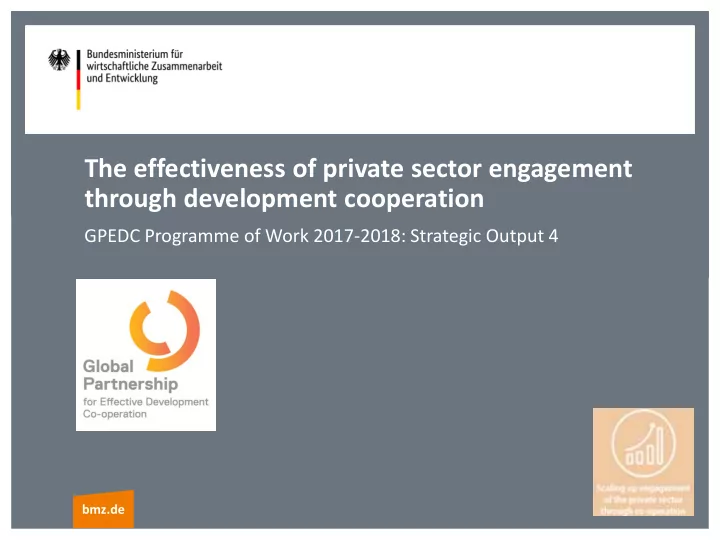

The effectiveness of private sector engagement through development cooperation GPEDC Programme of Work 2017-2018: Strategic Output 4 bmz.de
Promoting the effectiveness of private sector engagement through development cooperation Nairobi Mandate “… to set clear effectiveness commitments as the development community engages in partnerships between governments, civil society and the business sector that generate shared benefit for business strategies and development goals .” Guidelines & principles on PSE effectiveness Major output for 2019 HLPF & GPEDC contribution to SDG implementation Inclusive evidence & dialogue Case studies & analysis, engaging the development community & the private sector bmz.de bmz.de bmz.de
PSE activities: progress and incial findings Mapping of PSE platforms and initiatives Limited engagement and focus on effectiveness issues Approach Inclusiveness, Implementation, In-Country Case Studies 920 PSE projects and over 50 interviews Illustrative Findings from Case Studies & Emerging Issue Areas: • • • • • 11 % of projects 16% of projects 83% use finance, 13% include PPD space is explicitly target include but only 2% use governments as limited • under-served information on policy dialogue partners, fewer Lack of PSE and locations (5% the actual results or knowledge other actors CSR policies • • • poor & 4% 17% project sharing as DPs seen as Government women)… specific engagement cumbersome leadership is monitoring modality… partners… mixed • information… Capacity issues …Lack of focus on …Monitoring and …Consider the full …Partnerships not …Lack of investment leaving no one communication of “PSE tool - box” inclusive, simple & in local priorities & behind results is weak long-term enough buy-in bmz.de bmz.de bmz.de
Next steps: Inclusive Policy Dialogue and Principles Engaging the private sector Validation workshops with Country Action Plans, Business Leader Caucus Southern Partners Typology of PSE instruments Inclusive Dialogue Consultations with DAC, developing countries and other GPEDC stakeholders & Specialised Policy Dialogue 2019 UN-HLPF Launch of mutually agreed PSE Principles & Guidelines Modernised Effectiveness Framework Updated Monitoring FFD and SDG follow-up and Review SDG 17.17 on partnership quality bmz.de bmz.de bmz.de
Business Leaders Caucus: Overview The Business Leaders Caucus : is a senior level advisory group provides strategic advice and policy guidance on how to apply development effectiveness principles when leveraging PSE through development co-operation is not a platform for lobbying or a tool to influence or broker partnerships or business deals Its members : will make use of their existing networks, memberships in other networks, relevant events and other opportunities to raise awareness of GPEDC’s work on PSE will not represent the interests of the private sector or represent any single viewpoint in the Global Partnership bmz.de bmz.de bmz.de
Business Leaders Caucus: Proposed Composition bmz.de bmz.de bmz.de
Business Leaders Caucus: Composition Number: 12 (plus ITUC and ICC as associated members of the Steering Committee) A balanced mix of high caliber business leaders from MNCs, large domestic firms and SMEs (in technology, agribusiness, transport and the financial sector) and cooperatives All candidates with proven experience in developing countries, an understanding of development co-operation and effectiveness issues and/or experience in compliance with international business standards Pre-selected from a long-list of 32 candidates Gender balance: 50% 6 alternates of which 2 female bmz.de bmz.de bmz.de
Private Sector Work Stream: Timeline bmz.de bmz.de bmz.de
Recommend
More recommend